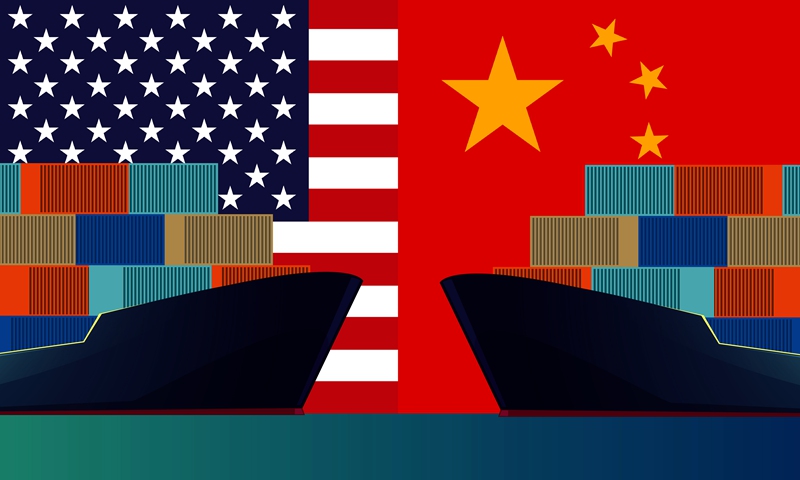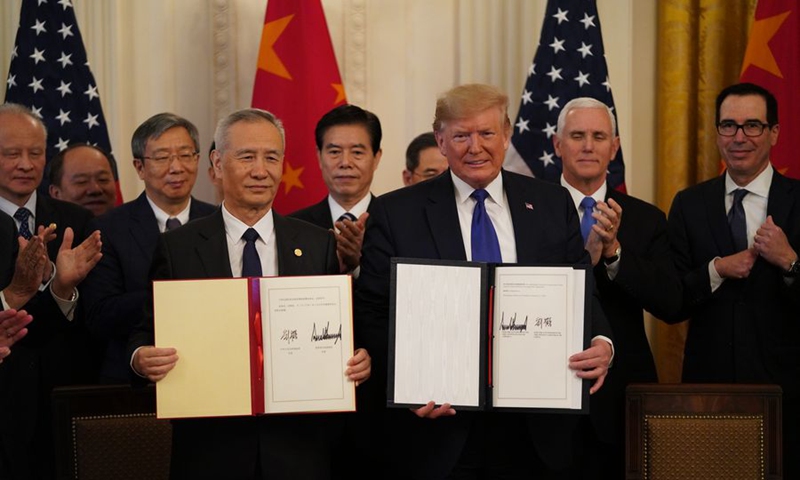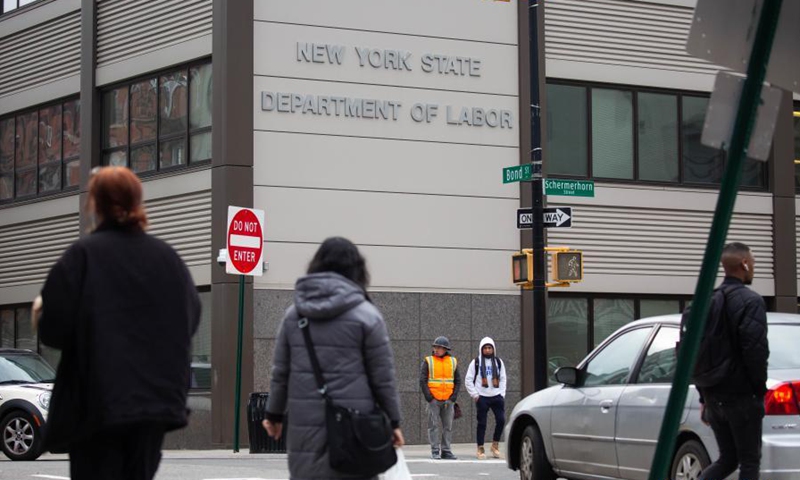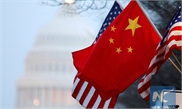China-US trade ties at turning point as world awaits new teams’ contact
Resolve disputes through dialogue to be urgent item for both sides: analysts

China US Photo:GT
With the first anniversary of the China-US phase one deal's signing falling on Friday, the entire world is glued to how the incoming Joe Biden administration will mobilize his brand new negotiating team to reach out to the US' most consequential trading partner at a time when the US is desperately seeking a way out of its divided political society and deadly COVID-19 epidemic.
This seems especially the case after Chinese President Xi Jinping, in a letter replying to Starbucks' chairman emeritus Howard Schultz on January 6, encouraged Schultz and the US coffee chain to continue to play a positive role in advancing China-US economic and trade cooperation and bilateral ties.
With changing dynamics, hopes are mounting that the two sides could find ways to manage, if not resolve, their differences and press the "reset" button on the relationship. If the relationship cannot be reset entirely, trade ties could at least be repaired as they have become more important than ever for both countries' economies as well as the global economy, Chinese trade analysts noted, arguing that there is an opportunity to turn the page on the trade war front, if dialogues and engagement are pursued quickly and with good intentions.

US President Donald Trump and Chinese Vice Premier Liu He, who is also a member of the Political Bureau of the Communist Party of China Central Committee and chief of the Chinese side of the China-U.S. comprehensive economic dialogue, show the signed China-US phase-one economic and trade agreement during a ceremony at the East Room of the White House in Washington D.C., the United States, Jan. 15, 2020. (Xinhua/Wang Ying)
Although the new US trade negotiating team has only been vaguely assembled, expectations are growing that the new administration is set to reconnect with China in trade terms.
Biden has introduced Rhode Island Governor Gina Raimondo as his pick to be commerce secretary - a key agency at the forefront of handling China-related policies, ranging from managing trade policies to formulating technology strategies.
Additionally, Katherine Tai, chief trade counsel for the US House Committee on Ways and Means, has been picked as the next US trade representative.
Tai has vast experience negotiating trade terms, He Weiwen, a former economic and commercial counselor at the Chinese Consulate Generals in San Francisco and New York, told the Global Times on Friday.
Personnel changes on the Chinese side have been seen as adding fuel to the hopes of more positive dialogues in the near future.
Zhang Xiangchen, who only recently stepped down as Chinese ambassador to the WTO, was announced Friday to be a deputy head of the Ministry of Commerce (MOFCOM), only days after the announcement of China's newly appointed international trade representative, Yu Jianhua.
MOFCOM did not respond to a request for comment as of press time.
Yu, also a deputy commerce minister, specializes in multilateral negotiations, and his new role as trade representative, one of the two ministerial-level positions in MOFCOM (the other being commerce minister), is apparently encouraging to the country's future trade consultations with the Biden administration, according to He.
The new staff appointments on the Chinese side, mostly due to the normal expiration of previous appointments, have not been specifically planned to handle the US' new administration, the trade expert noted, adding that they are similar to the recent announcement that China, EU completed talks over a bilateral investment treaty at the end of 2020; that is, it is by no means a rushed move ahead of Biden's inauguration.
Still, with the two sides' trade negotiation teams taking shape, there have been calls for more efforts down the road, especially from a Biden administration that is tasked with reviving bilateral trade, which is of utmost importance to the revival of the US economy.
The two sides could begin to establish communication via not only dialogues but also work toward more substantial cooperation in multilateral areas such as climate change and epidemic control, He suggested.
"The main principle when pursuing dialogue with the Biden administration will be managing both sides' differences so that conflict can be avoided, while also pursuing win-win cooperation."
The multi-year trade war with China under the Trump administration resulted in a peak loss of 245,000 US jobs, Reuters reported Friday, citing a study commissioned by the US-China Business Council, a business group representing major US firms with operations in China.

Pedestrians pass in front of the New York State Department of Labor building, in New York, United States, Jan. 8, 2021. Photo: Xinhua
In an escalated scenario, meaning a significant China-US decoupling, the US GDP could shrink by $1.6 trillion over the next five years, resulting in up to 732,000 job losses in the US by 2022 and 320,000 fewer jobs by 2025, according to the study. A gradual scaling back of tariffs, however, is likely to boost growth, resulting in an additional 145,000 jobs by 2025.
There have already been indications that high-level engagements could take place soon after Biden takes office on January 20. In what appears to be a call to action, the US Chamber of Commerce, the biggest business group in the US, saw that a high-ranking Chinese delegation plans to visit Washington early in Biden's administration, Reuters reported Thursday.
In a further indication of the US business community's expectation for communication between China and the new US administration, Myron Brilliant, head of international affairs for the chamber, said that a potential visit could help improve relations and progress in "an expanded trade agreement."
While both China and the Biden team have not announced any such plans, analysts say such a trip is not only possible, but also necessary for both sides to quickly start repairing damaged trade ties.
"I think [such a trip] is possible, even if we [China] take the initiative. After all, it would be good for both countries and the entire world," Gao Lingyun, an expert at the Chinese Academy of Social Sciences in Beijing, who closely follows China-US trade tensions, told the Global Times. "[The report of the trip] is definitely a good signal."
An ideal starting point for the two sides would be to hold a review of the phase one trade agreement, which, according to the agreement, should take place sometime in February, soon after Biden takes office. Under the agreement, which took effect on February 14, 2020, both sides would hold half-yearly reviews in addition to standard communications. The last review session took place on August 25, when senior officials held a "constructive" video conference, after which they vowed to further carry out the deal.
The most recent Chinese customs data suggested that China has been implementing the deal, under which China pledged to increase imports of US agricultural, energy and other products, by $200 billion during a two-year period. In 2020, China imported $134.91 billion in US products, up 9.8 percent year-on-year, with imports of US agricultural goods jumping by 66.9 percent, according to data released by the General Administration of Customs (GAC) on Thursday.
Biden has been critical of the phase one trade deal during his campaign trail, but also said that he would not make an immediate move on the trade war with China. However, as he moves to save the US economy, trade with China would be a top item for him to consider, even though he vows to be "tough" on China, Chinese analysts said.
Some US diplomats have already started to reach out to Chinese experts to discuss ways for the two countries to start communication and bring the bilateral trade relationship back on track, according to sources. US diplomats have usually ended conversations by saying that the new administration would strengthen cooperation, sources familiar with the matter said.
While both sides appear to be open to dialogue, there will also be an array of lingering disputes to be addressed, including the remaining US tariffs on hundreds of billions of Chinese goods, and various sanctions on about 300 Chinese firms, analysts noted.
He Weiwen said that China could ask Biden to lift some tariffs, because they are hurting US businesses and have been sued by some 3,500 US firms. "If the tariffs are not removed, it means the US has not returned to the WTO rules. And the basis for China-US trade cooperation should be WTO rules, not 'US' or 'Chinese' rules," he said.
On the phase one trade agreement, analysts said that both sides appear committed to carry it out at least for now, given its legally binding nature and that more talks are needed to figure out a path forward, analysts said, adding that despite lingering disputes the deal fails to address, it remains a starting point for further dialogue.
"The signing of the phase one deal instilled predictability in the markets. More importantly, it showed that China and the US could address their differences through dialogue," even when they were "at loggerheads," Gao said, noting that it paves the way toward better dialogue with the new US administration.

China fulfills commitments under phase one deal amid pandemic Graphic:Feng Qingyin/GT



